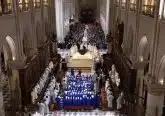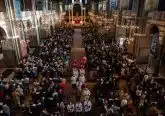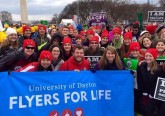GOP vice presidential pick J.D. Vance on why he became Catholic
Washington, D.C. Newsroom, Jul 17, 2024 / 17:35 pm
At 39 years old, Ohio Sen. James David “J.D.” Vance, Donald Trump’s newly announced running mate in the 2024 election, has a chance to become the United States’ second Catholic vice president.
Vance is the second-youngest member of the U.S. Senate. He took office in 2023.
He was baptized and confirmed in the Catholic Church at the age of 35 at St. Gertrude’s, a Dominican priory in Cincinnati.
In a 2020 article in The Lamp titled “On Mamaw and Becoming Catholic,” Vance reflected on his conversion as a process that occurred “slowly and unevenly” over several years.
According to Vance, his gradual journey to the faith was inspired by the example of his grandmother, “Mamaw,” whom he describes as “a woman of deep, but completely de-institutionalized, faith.”
After growing up in a poor Appalachian home, serving four years in the Marines, and earning a law degree from Yale, Vance says he considered himself an atheist.
Despite defying the odds of his humble upbringing and rising through the economic and social ranks, Vance said he was not happy with his state in life, and he began developing an inclination toward Christianity and Catholicism in particular.
“I began to wonder: Were all these worldly markers of success actually making me a better person? I had traded virtue for achievement and found the latter wanting,” he wrote. “There was a voice in my head that demanded better of me.”
“I felt desperate for a worldview that understood our bad behavior as simultaneously social and individual, structural and moral; that recognized that we are products of our environment; that we have a responsibility to change that environment, but that we are still moral beings with individual duties; one that could speak against rising rates of divorce and addiction, not as sanitized conclusions about their negative social externalities, but with moral outrage.”
More than any political philosophy, Vance wrote that he soon realized that this worldview he had been looking for was one he had long known: “It was my Mamaw’s Christianity.”
“Despite my Mamaw’s unfamiliarity with the liturgy, the Roman and Italian cultural influences, and the foreign pope, I slowly began to see Catholicism as the closest expression of her kind of Christianity, a faith centered around a Christ who demands perfection of us even as he loves unconditionally and forgives easily,” he wrote.
It was “the Catholic part of my heart” that Vance said demanded he think about the things that truly matter, that he treat his son with patience, moderate his temper, value his family above his income and prestige, and forgive those who have wronged him.
“If I wanted that part of me to be nurtured and to grow, I needed to do more than read the occasional book of theology or reflect on my own shortcomings. I needed to pray more, to participate in the sacramental life of the Church, to confess and to repent publicly, no matter how awkward that might be,” he said.
“And I needed grace. I needed, in other words, to become Catholic, not merely to think about it.”
In a November 2022 interview with “EWTN News Nightly,” Vance described the history and richness of the Catholic faith as the forces that guide his politics, saying that “one of the great takeaways of the Catholic tradition is that you both have a public policy that protects life and also respects the dignity of the American worker.”













